We’ve finally been getting around to setting up our spare room as my home studio and wanted to look into a new recording studio desk. After finding a bunch of crazy expensive options (along with some less expensive ones), we realized that there are not many desks for studios for most of us to choose from. But that’s not to say that it’s an impossible task, as there are some absolutely great budget home recording studio desks out there.
This very topic of home studio furniture is actually one of the reasons we started this site. After doing a good amount of research on building our own music workstation, we figured that other people would benefit from this as well. Our search was focused more on budget-friendly solutions, as well as home and bedroom studio situations.
For that reason, we’re omitting some of the bigger and more expensive studio desks like the ultra-popular Argosy, Omnirax, AZ-Studio Workstations, and the like. We’re also looking at keeping the price ceiling at around $1000. Yes, that’s still pretty expensive for a studio desk, but for studio furniture, it’s pretty reasonable.
We also plan on putting together an article about using non-specialized desks as a recording desk, and that will come soon enough. But for now, let’s get on with the show.
Contents
What to look for in a great home recording studio desk?
A good home studio desk needs to do a few things well, and thankfully it’s not much. But depending on your current gear, your planned upgrade path, and your room situation will dictate most of what you’ll be looking for in a desk for your studio.
Plenty of main surface space
Take a look at your current desk. What’s on the work surface? What can go, what needs to stay, and what do you wish you had there? Some people want room for a MIDI controller. Keyboard, faders, button strip, full control surface, etc. Others just need their keyboard, mouse, and that’s it.
Personally, I don’t have plans to add a keyboard or other sort of instrument controller, as I pretty much never use one. So far. But I do want to add a second set of monitors eventually and with that some sort of monitor control box. I’m not terribly demanding here, but many do need to have their controllers right in front of them.
Rack space for your outboard equipment
The main difference between a good home studio desk and a regular desk is the rack space. A majority of studio desks above 45″ is usually the presence of 8U of rack space, usually divided up into two 4U rack bays. So look at your current recording gear to determine how much space you need, along with what gear you plan on buying in the future.
A quick note: A rack “U” is one unit of vertical height in your rack. Power conditioners and smaller equipment are 1U, whereas a lot of pre-amps are 2U, or twice as tall. Usually, 8U is plenty of total space for the home recording engineer, and if you need more, there are add-on options.
Personally, while I don’t have anything rack-mounted other than a power conditioner, I do plan on upgrading to a larger interface, and perhaps a nice mic pre or two. Having the gear in rack spaces is nice, keeps it out of the way, hides your cable clutter, and generally keeps things in order. Having that built into the desk is what really helps justify the price tag for a purpose-built home studio desk.
While many people are skipping expensive outboard equipment in favor of mixing “in the box”, there’s still some critical hardware you’ll end up with as you progress, like the power conditioner, larger audio interfaces, patch bays, and usually at least a mic pre and compressor. If you think you’ll be getting serious about at least one signal chain, it’s worth planning ahead and getting some rack space.
Room for your computer displays
What’s your current computer monitor setup for your studio desk? Single widescreen display? Dual widescreens? Planning on being a baller and upgrading to a nice big ultrawide (or two)? Your display setup will definitely impact what studio furniture options you have available.
Well, not only do you have to think about the top shelf room for the display(s), but also for your studio monitors. If you have smaller 5″ or 6″ studio monitors, it’s not the end of the world to put them and a single 23″ to 27″ all on the same surface.
More than that on either piece of hardware, however, and you start looking into either much larger desks, or speaker stands for your monitors.
Studio desk cable management and computer placement
Need a keyboard desk? Is the desk high enough to accommodate one without slamming your knees into it? Most studio desks don’t come with a tray, so you’ll have to buy one separately, and take the main surface height into consideration when you do.
Do you have somewhere designated for your computer tower (if you don’t use a laptop or small form factor PC/Mac? Is your tower currently resting on the carpet? You should probably fix that, and a studiodesk with a bottom shelf is a great option. Otherwise, you can get a CPU/tower caddy to get computer towers up off the carpet a few inches.
Speaking of computer placement, cable management is also critical for an easily organized and operable setup. Will your new studio desk have some management trays and routing holes? Or will you need to go crazy with the cable ties or cable clips? It’s always easier to find a desk with good options here, as it will reduce the amount of extra work involved. Thankfully, most home studio desks do offer pretty reasonable cable management.
Studio desk size
The size of the desk you buy is often the most deciding factor when setting out to find a studio desk. A lot of home, project, or bedroom studios are limited in space, and so choosing a studio desk that fits whatever is available is paramount.
When I initially wrote this, I had just an inexpensive Ikea Linnmon desk with Adils legs that is about 47″ by 24″. I bought this years ago when I moved into a new place as a new computer desk and hadn’t intended on building a home studio. The Ikea Linmon is a very popular desk at a great price, but definitely not the best choice for music production.
It’s big enough for two 23″ monitors and small speakers, but ended up with one computer monitor and my Tannoy Reveal 502 studio monitors. I also had the display on a much too tall riser, with my Furman M-8X2 Merit Series 8 Outlet Power Conditioner and Surge Protector and old M-Audio Fast Track Pro sitting underneath it.
Before the riser, the Fast Track Pro always sat awkwardly on the desk and adding the power conditioner just exacerbated everything. But even with this newly available space, the desk itself was definitely too small and it soon became time for a much-needed upgrade to a better studio desk setup with more gear.
A comfortable office or computer chair
Yes, technically this doesn’t have anything to do with the desk itself, but there’s no stronger deterrent to wanting to sit at your desk than a terrible chair. And keeping with the budget theme of this guide we’re not going to be suggesting a crazy (but crazy comfy!) chair like the Herman Miller Aeron or Mirra, don’t worry. You don’t need to break the bank to get a comfortable, feature-rich chair for your home studio, you can find some great mesh office chairs under $200.
Large recording studio desks
Now that I have the room to grow my studio setup, I’m thinking more and more that a larger desk is in order. I also have plans to replace the Fast Track Pro with something much more new and capable, so that will be (most likely) another rack-mount device. I’ve also upgraded to a 27″ computer monitor as my main display and would like to add a second pair of studio monitors soon.
If you have the same hardware needs, you’ll definitely need a larger desk with more space for gear, and perhaps more rack spaces as well. These desks also usually come with a much higher price tag, but there are some great desks to be found at a reasonable price. So what are the options like when looking at larger home studio desks?
Acme Furniture Eleazar Music Recording Studio Desk
- Rectangular computer desk
- Keyboard tray included
- Number of stand: 3
Last update on 2025-06-04 / Affiliate links / Images from Amazon Product Advertising API
The Eleazar Studio Desk is a new addition to the list, but with the availability of the Studio RTA Producer Station desks we’ve traditionally recommended, we really like this desk as our new go-to large studio desk recommendation.
While there aren’t many details and we can’t track down the exact rack space information, it looks like there’s anywhere from 9U to 12U of available rack space in three divisions–definitely plenty of space for gear in this desk. Each rack bay has a shelf for either studio monitors or displays. This would make an excellent setup for a single ultrawide in the middle and larger 7″ or 8″ monitors on each side.
The whole desk is on wheels and does offer a slide-out keyboard desk. This is probably the best budget alternative to the Producer Station, especially at that larger size class. But it’s an excellent alternative to higher-priced Argosy-style desks and is worth your consideration.
Studio RTA Creation Station
No products found.
Not long ago, the Studio RTA Creation Station (most often listed as the “Studio RTA Work Station” nowadays) was a popular choice for anyone looking for a desk for music production. It’s basically a 60″ wide desk, with the top shelf at about 55″. It’s big enough for two 23″ (maybe 27″) displays, an ultrawide, or a single normal display and your studio monitors up on the top shelf.
Dual 19″ rack bays keep your outboard gear organized, and there’s enough room on the main surface for a keyboard smaller than an 88-key device. Even as the smaller sibling to the massive Producer Station it’s still pretty large and is a great workspace.
Not much going on in the way of cable management, but there’s room for computer towers down below, and I suppose you could always install a keyboard tray underneath the main surface if you need it. But finding this studio desk is getting increasingly more difficult, which is a shame because it’s a great compromise between the size groups above and below it.
Studio RTA Producer Station
No products found.
If you search for studio desks the Studio RTA Producer Station will often be one of the first ones you find. And this thing is huge. 72″ wide main desk surface, with the top shelf at 60″, it will easily accommodate most display/studio monitor combinations within reason. There’s plenty of cable management options and dual CD racks. Y’know, if you still keep physical media all over your desktop.
And rack space, glorious rack space–no home studio is complete without rack space. 5U rack bay up top, dual 13U bays below. It has a tabletop large enough for an 88-key instrument, keyboard tray, mini keyboard tray. And wheels. And like most Studio RTA studio desks, it comes in the maple pictured above, or a cool dark cherry finish. Although that one seems to not be easily found in most online retailers anymore.
But yeah, the Producer Station is big. It would take up at least 80% of the wall where my mix position needs to be in my room. But it would also negate the need to get speaker stands for my monitors if I wanted to run dual displays (or an ultrawide). And for some rooms, this would be perfect, for sure. If you have space and also have a ton of outboard gear, this desk is pretty much the answer.
Studio Trends 46″ Desk
Last update on 2025-06-04 / Affiliate links / Images from Amazon Product Advertising API
Studio Trends is another manufacturer you’ll find in your search for a budget music production desk, and hence its inclusion in this article. They have just about the same style of products that Studio RTA and On-Stage Stands stuff, coming in a maple or cherry/mahogany finish.
In their infinitely clever naming scheme, it’s readily apparent that this is a 46″ desk. So don’t plan on running dual displays or an ultrawide unless you plan on putting your monitors on separate stands. Just like most other studio desks, it does come with casters (which are optional on most desks) and some cable management, however, unlike the Studio RTA gear, there’s no bottom shelf to place your computer tower. Gotta put that on the floor, or somewhere else. Or you can be a cool kid and get yourself a computer tower caddy.
All in all, it’s a good desk though. Dual 4U rack spaces, cable management, and it matches up with their various extension sidecars. They also make a 30″ desk that has a single 4U rack bay, which is good for a much tighter space, or maybe a secondary station in your project studio. If you have a studio assistant whose sole purpose in life is to time-align things, stick them on that.
Omnirax Presto Studio Desk
No products found.
The Omnirax Presto is basically your middle point between the Studio RTA Creation Station and the Studio Trends 46″ desk. With both main and shelf surfaces at about 55″ across, you’re not losing any shelf space, while you slim down the overall shape, shedding about 5″ to maybe help fit into your mix desk location. Just like the Studio RTA though, it does have a bottom shelf for CPU tower placement, along with the dual 4U rack spaces.
The Presto does come in black (or gray, according to some), maple, or mahogany/cherry finishes. However, don’t be fooled about that keyboard tray–it’s not included, sadly. But overall, if you need something bigger than the Studio Trends 46″ but can’t fit the Producer Station, this isn’t a bad option at all. And from what I can tell from the reviews, the hardware seems to be better quality, as no complaints about the assembly could be found. But at more than twice the cost, it seriously better be solid.
Ultimate Support Nucleus-Z Explorer Studio Desk
- 2 x 4-space Rack Modules
- Studio Desk with Shelf
Last update on 2025-06-04 / Affiliate links / Images from Amazon Product Advertising API
Okay. This one is a bit of a reach in the whole “budget music studio desk” range, but hear me out. It’s a 60″ wide desk with dual 4U rack bays, full-width top shelf, and the main surface is about 23″ deep. As far as studio desks go, this is pretty great for the money, but it’s built to make music production as easy as possible.
Ultimate Support is a company that I’ve always felt good about, going back to my childhood. My dad was a working musician, and I remember when he upgraded from his heavy, clunky PA speaker stands to some nice, light Ultimate Support stands. And they never once failed during all of his gigs over decades. So yeah, I have no qualms about putting my studio on top of one of their desks.
The Nucleus-Z Explorer does have most of the other features as the rest on the list, including some built-in cable management and the ability to add on a keyboard tray along with extra floor-standing rack space, but it definitely looks completely different.
This is probably the closest you’ll get to that “Argosy look” without dropping the “Argosy cash”. Not saying that the rest of the Nucleus line is cheap by any means, but this is definitely the little brother to the Navigator, which starts at well over a grand.
The Nucleus-Z Explorer is also a great upgrade from the Studio RTA Producer Station, especially as that desk is now harder to find. It’s also a good alternative to the AZ Studio Workstations studio desks if that’s your price range.
Honestly, I’d love to have something like this in my room, but it’s definitely a bit of money. And it doesn’t have a bottom shelf for your CPU tower, but that’s not necessarily a dealbreaker.
Also, it’s one of the higher main surface heights in the list at about 30″. Most of the rest of these are around the 26″ height, so keep that in mind if you’re looking into the Explorer as the next desk for your studio.
Small recording studio desks
I initially wasn’t going to cover any of these just because I dismissed them for my own search. But honestly, might as well show what options are available in the under 46″ range. Sometimes space is at a premium, and that shouldn’t stop you from having a great music production workstation, so let’s take a gander, shall we?
On-Stage Stands WS7500 Wood Workstation
- Stable. Perfect foundation for a wide range of applications including recording, audio production, mixing, video editing, streaming, gaming, and work-from-home. The two-tiered desk provides ample space for a computer and additional equipment while maintaining a compact footprint to fit into bedrooms, offices, and other small spaces.
- Dependable. Heavy-duty steel Z-style frame delivers reliable support and provides a stable foundation for up to 175 pounds to ensure the safety of important and delicate devices.
- Convenient. Keyboard tray smoothly slides out from under the desk, keeping a keyboard, mouse, or micro-MIDI controller easily within reach. The spacious main surface provides plenty of room for MIDI controllers, mixers, studio equipment, camera gear, or gaming consoles. The upper tier has dedicated space for computer monitors and speaker monitors.
Last update on 2025-06-04 / Affiliate links / Images from Amazon Product Advertising API
This is probably the absolute first desk you’ll run across when you start searching for studio desks. While I’m including it in the small desk category, it’s not a tiny workstation. I thought it would be less wide than its actual 43″ width, but there it is.
It will most likely cap you out at a 23″ display and 5″ monitors, and I’m guessing that will be a tight fit. Don’t even think about dual displays or an ultrawide unless you plan on throwing your monitors on speaker stands.
On-Stage Stands makes all sorts of support gear for musicians and studios, and this desk is pretty highly rated on any site you find it for sale. If the Ikea Linnmon is just a hair too big, but a 30″ desk is too small, this one’s a great option, and available in maple and all black.
There is also a side car rack and a corner angle extension so the rack can be easily reached and still maintain a contiguous table surface. Overall, it’s a good option when working in a price (and space) budget.
Studio Trends 30″ Desk
Last update on 2025-06-04 / Affiliate links / Images from Amazon Product Advertising API
I briefly mentioned this desk when discussing the 46″ version, and it’s basically identical, sans 16″ in width. As a result, it halves your rack space down to a single 4U bay, but hey, if you’re cramped for space, most likely there’s not enough outboard gear to need more than that. All in all, it’s a solid little desk.
Conclusion
We know that finding the right home recording studio desk is a bit of a challenge, especially now that the Studio RTA Producer Station, Creation Station, and Studio Trends desks are nearly impossible to find. There are occasionally some other good options that do pop up, but the classic go-to music production desks are definitely getting harder to track down.
That said, we know there are still some great studio desks available, and we’ll keep hunting to find more options. We’re also working on putting together the non-studio studio desk guide, or however we end up putting it together, so keep an eye out for that.
What about your setup? Do you have a studio desk you love for your home studio? Is there a must-see desk that we’ve missed somehow? What sort of cool hacks have you found for your own workstation? I’d love to see anything clever or unique down in the comments below, so post your photos and let us know what you’ve done.


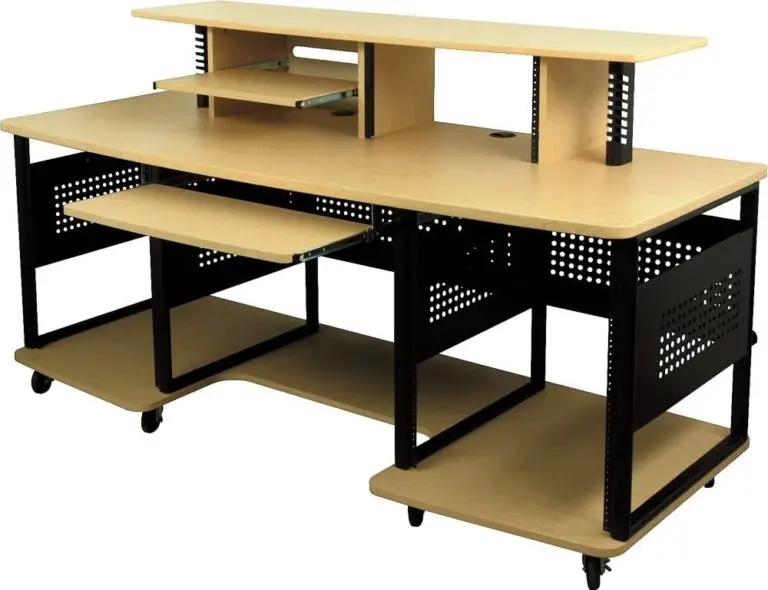





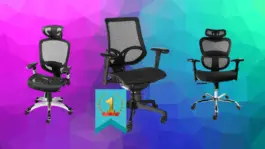
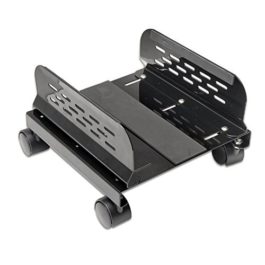
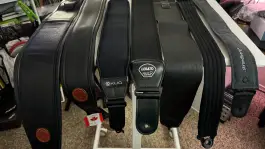
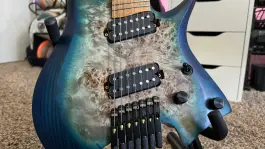


0 thoughts on “8 best budget home recording studio desks [2022]”